
Bait & Switch
After Anti-Reset (and the preceding Stay By My Side and You Are Mine), I already did not have high hopes that this newest product from VBL would delve into the SF aspect or even the philosophical aspect of Human-Android relationships.But what I got was even worse, a Bait & Switch.
They lured us with an intriguing opening scene (AI rights -- a often-discussed question in SF stories, should a self-aware machine with a free will have rights, just like a human?), tantalised us with more knowledge about how the Ever series androids work, the androids bleed, have a heartrate -- basically seem to have a human body, but are enhanced (at least Ever 4 is), and don't age, the story also gave us glimpses of the other Androids (talked about Ever 2, we saw Ever 7, who is a look-a-like to Gu Bu Xia) and so on.
The questions if a human-android relationship would work, and how this would impact society, or what "love" is (can a machine love?) are not new to the genre and are extremley obvious in the premise itself ... and the story gives us crumbs, only to leave us with nothing.
Instead, they gave us the switch: A clichéd story about a young man who still carries trauma related to his mother (ugh!) and who only needs a devoted butler/confidant/lover to heal him, and we never get any more information about the world they are living in.
Characterisations are weak. I already mentioned the ultra-chlichéd background story for Lo Bus Shi. Ever 4 also did not have a consistent character. He is supposed to be mainly a bodyguard/fighter/strategist type of android, who is not supposed to give emotional support to his master, so he should have not been given data for this. He talks about struggling with emotions, asks Ever 9 for advice, but then proceeds to do everything perfectly (like a stereotypical top, see below). This would have been an interesting avenue to explore: Where do emotions come from? How do they work? Or another aspect to explore: The inherent power imbalance between master and slave (in this case, android) -- what does this mean for a romantic relationship? And if they'd further developed the dom/sub vibes Ever 4 and Lo Bu Shi gave throughout the series, this would have added another layer to the question of power imbalance.
Other things that irritated me:
* Ever 4's glasses didn't make any sense. Not only the "dom mode", that is just another Bait&Switch, but especially when he takes them off because "He trusts Lo Bu Shi" -- why does he not put them on again whenever he is alone or in a confrontation. Feels like the director just wanted an excuse to put the glasses away.
* The whole top/bottom dynamic was stronger than in the other VBL productions I've seen, and it made me angry when several characters (Lo Bu Shi included) implied that to bottom during sex between men means that you are less manly for it. Couple interactions were written along the lines of stereotypical dynamics, and, of course, the top is more than capable of doing anything, while the bottom is the one who is cutesy and must be protected.
* The secondary couple was superfluous. There wasn't enough time to develop a good progression, and there could have been another reason for the fall-out between father and son. The writer should have taken the time to further explore the really interesting questions (see paragraph two) or to make Ever 4 more consistent.
Was it good?
As before, VBL take an interesting (and, for a BL drama, unusual) premise -- and only briefly dip their toes into it only to then give us another fluffy romance without much substance. I did not mind so much in You Are Mine, because that one was a comedy first and foremost, and it did that well (even if the power dynamics between boss and employee should have been more developed), but it had already frustrated me in Stay By My Side to the point that I had to put it on hold for a while. Here, in a drama with such an intriguing world, it's sad, even for VBL standards. And no, the last ten minutes of episode 12 dd not save it.
Did I like it?
I wanted to like it. But with this Bait & Switch, I couldn't. It was watchable, but also irritating because it could have ben more, at least a bit. Overall, for an android-human relationship, I'd rather rewatch Anti-Reset, which at least knew what it wanted to tell us, than this.
Do I recommend it?
Only if you are seriously into the looks of the actors. If VBL decides to make more BLs for the other Ever Series androids, then there might be some background informations that could be useful. But that's hard to say at the moment.
Was this review helpful to you?

BL Drama no Shuen ni Narimashita: Crank Up Hen
1 people found this review helpful
* the runtime is not too long, so it's perfect for a rewatch in between new dramas,
* it is a sweet and beautiful love story with some tongue-in-cheek tropes, that makes me fall in love with the way the main characters fall in love,
* there is some character development, that links past and present, and gives some depth to the story,
* side characters have their own story to tell,
* the production value is high, in every aspect: I love the clour schemes they chose, the details on the sets, the make-up and hair dressing (which uses different styles for the characters when they are Akafuji and Aoyagi vs. when they are acting in the BL),
* Abe Alan and Akutsu Nichika play both of their respective roles very well, and are able to give them very distinctive personalities -- I love it when the director shout "CUT" and the BL character vanish, leaving Akafuji and Aoyagi behind,
* every actor in this is fully immersed in their role -- for some scenes with lots of characters, I like to rewind them, just to watch what is going on in the background,
* it's making fun of the BL world, with the feathers and the adoring fans, the tropes used in the "BL Drama" of the series and more,
* it's also a commentary on the film industry, how hard it is for child actors when they grow up, and the toxicity of fans,
* and the humour is my kind of humour, this Japanese kind of slapsticky over-the-top humour that some people can't stand.
Overall, I can't find anything I dislike about this, it's perfect for its runtime, has a simple plot on the surface but those who want to can also find some deeper meanings.
Was this review helpful to you?

Delightfully educational
In accordance with the name of the show (เตร็ดเตร่ /tred tray/ means "wandering"), Tay Tawan takes a guest or two and travels around Thailand to various festivals, explores their origin and their history and gives us insights into Thai culture and Buddhism. He takes part in the festivals, interviews locals and obviously enjoys the chance to be a nerd on camera.I loved that he is genuinely interested in what he learns and how he connects new knowledge to what he already knows -- and how he is able to explain things clearly to his guest (and us) so that we can understand.
(His way of speaking and thinking reminded me of my fellow students at uni, when we studied Latin together, and our colleagues from the other departments like Ancient Greek, Classical Archeology and Medieval History. I think if Tay Tawan and I met in real life it would be delightful to be nerds together and to compare the histories and cultures of Europe and Thailand, and learn from and with each other.)
I loved the poems which introduced each episode (and I hope to rewatch in ten years or so when I know enough of the language to understand them).
Also, the ubiquitous product placements were minimal, in the first few episode I didn't eeven really notice them. And though they got more screentime in later episodes, it was very much bearable. Unlike in the Tred Tray Special episodes by the way, especially from special ep. 3 onwards, where it feels as if half the runtime is given to the avertisements. If you want to continue the learning journey with Tay, I can only recommend the first two episodes of the specials, the rest is only bearable for die-hard fans of Tay Tawan or his guests.
So, great insights into Thai festivals in 13 shortish episodes -- might give us an idea or two for festivals to visit in Thailand!
Was this review helpful to you?
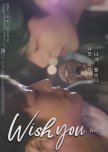
Wish You: Your Melody From My Heart (Movie)
1 people found this review helpful
A musical movie or a music video with added dialogue?
If you have the choice between the series and the movie, then watch the movie. It has several scenes that are missing from the series and round out the story.What I liked:
* I loved the two female characters! They did not have much screen time, but showed some interesting character traits nevertheless. The team leader is obviously under a lot of pressure to produce music that sells well, is a real career woman who can be ruthless at times, and at the same time she seems to want to produce good music as well. The deputy is similar, and she does care about the people who work under her, at least Sang Yi. It is a delight to see women who are people with their own ambitions, even if they are supporting characters.
* I liked Lee Sang's acting. He did a good portrayal of his crush in the beginning and his shyness to speak to In Soo.
What I did not like:
* The story was thin, very thin. The premise has great potential for more, and it's saddening to see that it wasn't developed more. On the other hand, it was a good decision to not put too much into the short time frame.
* The lighting was at times a bit too much on the mood lighting side.
* I wish the scenes the singers would actually sing what we hear, not just be shown as a bautiful backdrop to the music.
I am torn about whether there was too much music with pining stares and montages or not. On the one hand, it is nice that the story took its time to unfold -- and it is about two people who fall in love with each other's music first, and then with the person. If there was less singing, I would maybe have complained about that.
On the other hand, those scenes took away time that could have been used for more plot or character development. Sometimes I fellt like I was watching a music video with interspersed dialogue.
You can watch it if you have some time on your hands and can use a pick-me-up, but you won't miss much if you don't.
Was this review helpful to you?
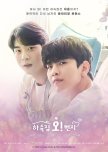
What I liked:
* All of the characters in the boarding house. They each have their own personality, which we can see even though the story's so short.
* The acting. All of the actors make it possible for us to get to know the characters and their thoughts.
* I liked the friend from college, Bong Deok, the most, who showed remarkable depth of character. Kudos to his actor, I'd like to see him in more dramas.
What I did not like:
* I think they people responsible for the project chose the wrong story for their format. For these short dramas / average length movies you cannot have an ensemble drama and expect a cohesive storytelling that has enough depth to be satisfying. Something will have to be left out, and it shows. I imagine the original work this is based on is much longer and allows for more character development.
* Why did they bleep out the swear words, even put a flower over the actor's mouths? I don't understand why they did not just put a different text for the actors to speak there, if they wanted to keep their low age rating.
Overall impression:
I do not regret watching this show, as the story was cute, the characters likeable and the actors did well. But this is by no means a must-watch; we have enough BL dramas by now that we can choose those of higher quality.
If you have not yet seen it, but want to, I recommend watching the series, not the movie. Although the change between episodes is a bit annoying due to their shortness, the scenes which are not in the movie are entertaining. Also, the movie's background music is sometimes a bit too strong.
Was this review helpful to you?

What I loved most:
... regarding the story:
* I loved the characters -- except for a few of them who were hopelessly inhuman in their emotions, all characters have strengths and weaknesses to them. These are not always explored into the minute details but very much obviously there. The characters feel like people.
* All fights for the truth, all struggles for justice are not 100% successful. This is not a fairy tale, where the good guys win and all the bad guys are punished. The system stays firmly in place. Maybe some have learned a lesson, but not all of them.
* And still, things are looking up, at least in the personal lives of the "good" side. There's hope, as long as we are living.
... regarding the technical side:
* The actors are amazing! Facial expressions, body language, all perfectly controlled -- especially hard for the more multi-faceted characters.
* Loved that we get to see the progress of time via the background nature. We start in the bleak winter days and end at early summer -- I wonder if this is accidental or if we may read it as metaphorical.
... regarding the rest:
* No romance! Always a plus for me. Yes, there are two or three scenes, in which there are interactions which could be seen as light flirting or something, and once some short and good-natured heckling, but all of them can be easily ignored and nothing is ever openly acknowledged.
* For a S.Korean crime drama, there are astonishingly few scenes of senseless or exaggerated violence. There is violence, of course, but it always serves the plot in its intensity.
Recommended!
Was this review helpful to you?

This review may contain spoilers
Please pay no mind to the star ratings for this review. Because I admit it, I am one of those people for whom this series has nostalgic value. When I first watched it in 2022, this was only my second live-action BL drama (and my first encounter with anything Thai), and I was *fascinated*. I had been reading Japanese BL manga in the early 2000s and I have been a voracious reader of slash fanfiction for more than 25 years now -- but I never knew live-action BLs even existed until 2022. So, I was feeling slightly overwhelmed, and this makes me feel more favourable towards this series than it deserves.
Because, if we are being honest, apart from Pete and Ae's love story, this drama is not very good.
It starts with the technical side:
The colours are strangely subdued (for a Thai production), without there being a narrative reason for it. The background noise is at times overwhelming (especially in a scene where Pete, his mother and Ae sit near a fountain) -- although at other time I find it charming to hear university life going on in the background. We can hear clothes brushing over microphones in some scenes. Props are not quite what they should be (thereare props from IKEA at rich Pete's house, and school bags are often obviously empty. In some scenes the actors look as if they had to do their own hair and make-up.
The show obviously had a rather low budget; but not everything about it is bad. I love the messy dorm room -- a bit icky, probably hot -- and both the flat colours and the background noise give the university grounds a realistic vibe -- watching the young people in the canteens, on the walkways and on the football field, surrounded by the noise and heat of Thailand, I always feel that this is just one of many stories happening on the campus. It's nothing like most of the newer airbrushed and clean BL drama, which are painfully obviously set in drama-land.
If we're looking at the acting and the directing, the series is mediocre: Some scenes are full of awkward acting -- some are more watchable. Since most actores were complete newbies at the time, I can understand it -- but better directing could have helped here. There are some scenes that are outstanding though. One of them is the beautiful coming out-scene in episode 1 -- the hesitation in the beginning, the way Pete's mum suppresses her own feellings and turns away and towards Pete again and again, the tentative questions and the short but reassuring answers, until both are in tears, the hesitant acceptance in the end -- this is the kind of coming-out scene I miss in newer BLS, where acceptance often is immediate and coming out is no big deal. (And while we here, I love that Pete describes himself as "gay", and doesn't only use descriptive terms.)
And an upopular opinion, maybe: I wish they had cast someone else than Perth for Ae. Don't get me wrong, Perth does a good job (especially considering his age)! But Ae is time and again described as short, stocky and dark -- Perth is none of these. Ae's appearance is an important part of his character though, and one of his sources of insecurity, and I would have liked it bo be more obvious. Alos, I would have liked to see the visual difference between a dark, stocky and short Ae and a light-skinned, tall and lanky Pete.
And now to the most obvious flaws: the storylines. We have five couples here, which is aready too much for a fourteen episode series, and half of them are not what I'd call good romance.
The one with the least screentime is also the worst -- outright rape, and subsequent victim-blaming, which is only played for laughs? Yeah, this is where it becomes very clear that this is based on a MAME story. Since this was a Wabi Sabi production and aired by GMM25, there must have been people in charge who worked independently from MAME and should have been able to cut this from the drama? I really don't want to know what the producers and screenwriter were thinking.
The story of Tar and Tum is very flawed -- I don't really mind that they are step-brothers. Two consenting adults can do what they want, in my opinion, as long as there won't be any children (the risk of genetic diseases is just too high). The thing is, there's no consent here in the scene where Tum tries to assault Tar. What I don't like about this subplot are two things: a) the story neither begins nor ends within the series. We don't know the background if we don't know TharnType, and the story does not stop at a satisfying point. And b) Tar's trauma is not handled well. If he's still victim-blaming himself-- then why is he not still in therapy? Why does his brother not know anything about it? (He doesn't need to know details, but it's quite obviuos that Tum is completely in the dark here.)
Putting the Tar/Tum story and the No/Kengkla plot next to each other -- why? We have a guy thoroughly traumatized by rape and in the same drama, rape is supposed to be something funny? Doesn't compute at all. Why did nobody notice?
Can and Tin, well. This is a mixed bag for me. I strongly dislike the "top pressures the bottom into sexual situations" trope, so I was not enamoured with their story at first, or later. Can is clearly not in a mental place where he is ready to enter *anything* remotely romantic / sexual, and Tin is only trying to get someone so he won't be alone any more, so his pursuing Can is not about Can, only about himself. So, I was really happy with their ending -- Can got a good character development arc, where he ends up realizing what a romantic/sexual relationship could mean for him, understanding that he does not want it at the moment -- and consequently rejecting Tin. Go, Can!
I did love Cha-Aim and Pond. I love their constant bickering, love how she always pushes back at Pond whenever he gets too much. I love a woman who knows her worth, and can clearly communicate her boundaries and her wants. Pond comes across as this slightly icky, sex-crazed porn addict (and I don't love his slightly homophobic attitude at the beginning). But as we get to know him, we can see that behind his "Three S" behaviour, there's actually a guy who cares about his friends deeply, and who never judges people for who they are.
Well, and Pete and Ae? Their love story is the one reason I can't give a lower rating than I did. This is a wonderful teenage love story, with a lot of "firsts" for both of them. I usually don't like the top/bottom dynamics, which are extremely strong here (Ae is rough, strong, possessive, while Pete is meek, soft, and very shy). But with them, it fits -- here, it feels as if they are two halves ot the same whole. And while Ae is extremely possessive, he is also someone who doesn't feel as if he deserved Pete (and seeks reassurance from Pete!). Yes, Ae is clearly the dominant partner -- but as a good dominant partner should, he always chacks in with Pete and tries to be aware of any boundaries. Even the "gay for you" trope works here, since Ae hasn't had any sexual desire before.
Like with any good teenage romance, both Pete and Ae grow in the course of navigating their relationship, and are more adult in the end than in the beginning.
So, can I recommend it?
Not really. There's so many good BL series nowadays, that it's really not necessary to watch this one.
On the other hand, Love by Chance *is* one of the classics which laid the groundwork for following works. And Ae and Pete are just adorable. Should you decide to try it, you should be aware of the show's many flaws and prepare yourself for a rather explicit rape scene in episode 14. Or you can just fast-forward through all of the scenes with Kengkla (No alone is okay) and with Tum or Tar in them. You won't miss anything.
Was this review helpful to you?
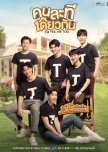
When I first watched this series some time ago, I did not know ANY of the actors (yeah, I don't know how I managed that, either) -- and I still liked it. So, it's not all fanservice here. It does feel like a low budget, Covid-influenced production; most of the scenes take place in or around the house, there's only a small cast of characters, it still manages to tell a good story about six people who find strength and support in each other.
One aspect I am not a fan of is the sub-plot about the father, which was a bit too "lakorn"-ish for me. But it's thankfully only a small part of the series.
I love the credit song and it's text -- it's been stuck in my head since I started rewatching this a few weeks ago, and the text is such a comfort.
A short note on the title, "I'm Tee, Me too" is okay -- but the Thai title คนละทีเดียวกัน is great and has many meanings in one sentence!
Maybe like this: คนละ = to each one, each one differently -- ที = Tee -- เดียวกัน -- identical, same.
Or: คนละ = to each one, each one differently -- ทีเดียว = quite, very; a single occasion -- กัน = each other, together.
Or you could read every syllable on its own as one word each; here's a link, and you can find your own translation http://thai-language.com/?blu=pLnF0LfV4LTVwseh0bkI
All of the Tees get their own story, their own problems they have to live with -- and I like how their psychological issues are not completely healed at the end. In that way, the series takes issues of the mind very seriously. And at the same time, the way the problems and the "solutions" are presented are hilarious.
This good balance of comedy and deeper meaning makes it a drama that is well-worth watching.
Was this review helpful to you?

Light, soothing, slice-of-life
This is an absolute gem among family-themed series. It's feel-good, light and easy to watch on a hectic day with its short 15-minute episodes.Let me highlight some of the things I loved:
* I am most impressed by the child actors. It's no simple feat for a child to portray a character so consistently as they do.
* I love that the two families are not your picture-book families (Mum, dad and their two kids). One is a family of four boys, who live their lives without parents, the other consists of a divorced mother with her two kids who live with their grandfather. Both families are shown as full of love for one another, as they navigate typical problems with school, growing-up, parenting etc.
* While it might not be very common that four boys continue living with each other after their parents passed away, the difficulties in the drama are real-life problems that most of us have had at one time or another -- I think viewers of all ages can find something to relate to here. Problems are always resolved by good communication and assuming that the other person acted not out of malice but well-intentioned.
* While most of the episodes lean into a more comedic style, and there's plenty to laugh (with the characters, never at them) -- the loss of the brothers' parents is not once taken lightly. There were several scenes that made me cry.
* All of the recurring characters are fleshed out, with their own story to tell -- and they are accepted the way they are by the others.
In some episodes, you can clearly see the manga heritage -- there are a few that are more supernatural in nature, which some viewers might find jarring, and there are some episodes that are clearly over-the-top.
I admit, at first, I wasn't too enthused that this is another drama about four male characters -- but after a time I noticed that a) there are more than enough well-rounded female characters with their own story, b) with a girl in the family some dynamics would have changed, and not for the better, and c) it takes the opportunity to gently subvert gender tropes. The oldest brother takes on household chores (cooking, cleaning etc.) willingly, and does them really well without outside help, and the younger borther pitch in. Except for one instance, nobody doubts that a man can care for his younger siblings. The divorcee neighbour is a police officer and while she is at work, her father cares for the kids (and the youngest brother).
Overall, this is a gentle and soothing series, perfect to watch if you need something that makes you feel happy.
Was this review helpful to you?
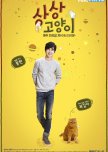
This review may contain spoilers
I usually don't like cats. But the picture looked cute and the series is short, so I thought, why not?What I liked:
* I loved the male lead's acting -- his face was so expressive, and made his emotions, whether spoken or not, very clear to the audience, without being exaggerated.
* Loved the best friend and the editor -- they were supportive and gave some much needed comic relief at times.
* Bok Gil's voice acting was spot on.
* All of the actors were great, and they all did what they could with their roles.
* I also liked the general idea of the story -- a young, traumatized man who finds solace in his pet and during the development of the story the ability to move on. I also loved how during the first six episodes, everything seems to go wrong, and the male lead has to juggle all of these demands plus his worry about his cat. In this, the series is a wonderful slice of life drama. And for the most part, things fit well together -- with the exception of the female lead.
So, before I talk about her, let's count for a minute. When the traumatic event in male lead's life happens, he is a high school teenager, so between 16 and 18 years old. A year later, he finds Bok Gil and lives with her for seven years, until the present day. So, he is probably between 24 and 26 years old. He definitely has finished his university education. The female lead is, according to her, the same age as him.
And now to the "What I did not like" part of my review:
I think who ever wrote the script did not do well in writing the female lead's character.
In the first half, or rather, three-quarters, she is dramatically emotional, clinging to every cat she sees and bawling her heart out. She does not know boundaries, courteous distance or privacy but rather barges into the male lead's life, even though he tells her to stay away several times. This behaviour would have fit better with a teenager, not with a woman in her mid-twenties. If she had been a teenager, I would have liked that better than what we got. It would have fit the story better, and the writers would also not have forced another lukewarm heterosexual romance down our throats.
(They could have left out the romance aspect regardless, since it only played a minuscule role in the story. I really don't know why writers think their dramas must have a (het) romance.)
One explanation for her behaviour could be that she was so traumatized by her illness and the disappearance of her own cat at the same time, that she now acts that way. If so, the show should have gone deeper into her past, into her life and that could have given her a real character development. Instead, she mainly serves as the catalyst for the male lead's character development instead of getting her own character progression, which unfortunately happens all too often in all kinds of dramas.
All of this, plus the completely uneccessary love-triangle, made this drama hard to watch. The slice-of-life storyline was nice, and you'll probably enjoy the cat scenes, if you are seriously into cats.
Was this review helpful to you?

This review may contain spoilers
Most of us who have already passed the age of fourty will probably concur that this age does feel like a threshold. Whether your kids are starting to leave home (or will do so soon) or your parents start to need your help (or pass away even) -- suddenly, you notice that you are no longer young and chances are that the years ahead will be fewer than the years already behind.Add to that the comfortable days you are living -- you finally settled into your job and know your role, days have a predictable routine. You think you know yourself, what you want and what you fear.
Youth seems like a dim memory, something you are no longer allowed to have.
But Kozue is lucky. He gets a Togawa, and is able to rediscover his own self, and find new passion for life (and for love). This story is told concisely, never rushed. No scene, no line of dialogue, no gesture is unecessary. Both leads and the supporting actors act with precision.
Browns and greys, shades and dim lighting are contrasted with bright spring greens and the lovely crisp spring sun -- Colours, light and shadows play an important role in this drama, if you care to look for it.
Follow the colour, the sets, the acting, which gets increasingly tight, tense and even oppressive -- the tension rises, until Togawa reaches his breaking point -- and it seems as if things are broken. Everything is grey and brownish again, but changed. Spots of light and colour show how Nozue's life has already changed -- but wouldn't it be brighter and livelier with Togawa in it?
Even after watching this lovely series more than a few times, I haven't found anything that I don't like -- it's that excellent!
Was this review helpful to you?
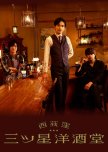
[Edit: I have since found out why: There is a special job called "food stylist". With the Japanese eye for details, it's no miracle that they excel at it! https://en.jff.jpf.go.jp/article/namiijima2021/]
Most of us probably know that bartender stereotype -- that you can come to him and tell him all your worries. In this series, this is exactly what happens in each episode: A customer finds their way into the little bar, and with the help of canned food, mixed drinks and the gentle smile of the bartender people tell their worries and find a way forward.
I loved the stories the customers brought into the bar, they were mainly real-life problems, that we as the audience might also have. These problems were not alway solved to perfection, but the customers always went home with a sense of hope for the future.
I also liked how the customers' stories tied into the lives of the three main protagonists and helped them find their own path forward.
Overall, the pacing is slow, which I found appropriate to the setting of a small bar. The set (which is almost only the bar and the street directly in front of it) fits the story, and the mood -- slightly run down, looking towards an end, but still lovingly maintained.
If you like something different, slow-paced and down-to-earth, with great food and drinks, then this is for you.
Was this review helpful to you?

This review may contain spoilers
tropes all around
Screenwriter: How many tropes would you like?Producer: YES.
This is a fun, tropey little love story, which has fast become one of my to-go-series if I need a pick-me-up.
What I liked:
* This drama makes heavy use of the one trope I can never get enough of: mutual pining with a side of miscommunication; while still keeping just to this side of frustrating.
* I loved watching the facial expressions of Kaneda -- he's so repressed, and when things overwhelm him, his emotions either explode out of him or he completely shuts down, which the actor portrays really well.
* Both Kaneda and Yanase try to respect the other's boundaries (or what they think the other's boundaries are). This is on one hand really nice to see: I really hate this trope of the pushy "top", who pressures his partner into things (and this is one of the things the drama does better than the oringinal manga). Yanase pulls back after that kiss in the first episode since he thinks "It's not like that", that probably Kaneda is straight and is not interested in anything sexual, he also pulls back any other kind of physical touch, since Kaneda very clearly said he does not want it.
* On the other hand, in later episodes, both believe that there are boundaries where there are none, adding to the miscommunication.
* The first half of the drama makes time for Kaneda's feelings to evolve from professional admiration to hero worship to something more balanced. At times it's a bit too subtle, but if you look at Kaneda's facial expressions and the way he talks to his Senpai, I think you can see it clearly.
* I also like these two last episodes (did I mention that I am a sucker for mutual pining?), I feel they make the relationship more balanced. Both have "leveled up" in their profession, and Kaneda does not only need any help anymore, he even has his own Kouhai! We finally get to see more of Yanase's feelings, and how he also has a hard time to express himself. Now it's him who speaks first, if a bit obliquely, of his feelings.
There are only two things that could have been better:
* Kaneda's hair really does not fit his face, a bit shorter or at least a bit darker would have been better.
* I would have loved to see more of how Yanase's feelings evolved, we only get to see glimpses, which is a bit unfortunate.
All in all, I love this drama, and can wholeheartedly recommend it to anyone who likes a bit of mutual pining!
Was this review helpful to you?

Mr. Unlucky Has No Choice but to Kiss!
1 people found this review helpful
This review may contain spoilers
"Mr Unlucky Has No Choice but to Kiss" is a series that has both a title that is too long and episodes that are too short.Or maybe the episodes are just long enough -- long enough to develop a light-hearted story that makes us fall in love with the main characters and get to know the side characters. Dragging it out would not have helped, in my opinion.
This is what makes the show outstanding:
* The acting for Fukuhara's character is on point. I love how the actor can go from fake high-pitched cuteness when covering up his bad luck to real joy when something goes right, to his inner monologues complaining about his bad luck, to his real self when talking to Shinomiya.
* I like how the professor's lectures fit into the developing relationship. Also, from what I know of psychology, the theories presented are actual theories.
* It is astounding how the people working on this show have developed the supporting characters so well that I feel like I know them, even though they get very little screen time.
* The attention to detail in both the acting and the sets makes this show worth watching more than once (or twice. Or three times.)
* I am also glad that the issue of consent is so prominent in the story. (Especially as it's a point of concern in some other BLs.) Not only is it discussed several times, but the characters follow through to the end -- even to the frustration of the character who said no. The sudden kiss in episode 1 is also discussed later. (So, actually, the title is wrong. Fukuhara Kouta does have a choice to kiss!)
I also love how they showed that Fukuhara with his bouts of bad luck and Shinomiya with his incredible good luck both stand apart from the people around them. Now that they have found their counterpart who can bring balance to their lives, they will be able to open up to others and live as normal people among them.
I must admit that the nature in the background always confuses me a bit, as the story is set in April, but the nature looks like autumn -- but that might be because the whole colour palette tends towards brown and orange?
All in all, I highly recommend this series. It's fluffy and sweet, something nice to watch when you need a pick-me-up.
Was this review helpful to you?
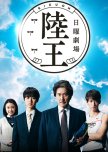
This review may contain spoilers
The drama's main theme is a small, declining business with a tradition of 100 years that fights against financial pressures, the bank, a behemoth of a business rival etc. etc. There are some earnest speeches with a lot of pathos and "ganbarimasu" -- I feel as if every main character has a similar story of failure (a patent that has not been picked up, a declining business, failed interviews, sports injuries) and it's a story about being the underdog who takes second chances they don't actually have.
It's very David ("heart and soul", the people are what's important, hard work and tenacity makes you successful) versus Goliath (money won't make you happy and shouldn't be your goal in business life), and the general outcome is quite predictable.
The acting was top-notch, and the overall quality great; even after just a few minutes of the first episode I started to care about the little tabi factory and its people, which made me watch the entire thing. Nevertheless, I found that the episodes were structured too similarly, so they got a bit repetetive, with one or two main obstacles, that are solved during the episode, and at the end there's a joyful "We made it", at times with an added a glimpse of the next problem. There were about three musical pieces that were mostly uplifting in nature, which also got a bit boring.
Something I liked is that there were more people in their fifties than younger characters.
I was annoyed by the implicit misogyny -- none of the female characters had any role but to say supporting things to the men; anything that pushed the plot forward was done by men. And, when the older son doesn't want to inherit the business, nobody even asks if maybe the daughter might want to?
One thing that I found rather unrealistic:
A person, who invents a whole new material and builds the machine to produce it with his own hands, and then holds a patent -- wouldn't he rigorously test his invention early on, to understand which influence all of the variables of production have? It seems that after Iiyama had invented one working verson procedure, he called it a day?
(Also, a mechanical engineering, material engineering and electrical engineering are different fields of expertise! Does Daichi have three degrees?)
I was also some other plot points I found a bit strange. For example: There's a fire, and a machine is destroyed -- and there's no insurance? Not even a small one? Also, why do neither Iiyama nor Miyazawa ever try to negotiate when they get offers they don't want to take -- only in the second to last episode Miyazawa gives a counter offer.
All in all, it was entertaining, and I'm glad to have watched an example of the dramas based on the successful Japanese "business novel" genre. If I do watch another one, then maybe a story by another author though.
Was this review helpful to you?


 2
2 10
10 1
1 2
2 1
1





















